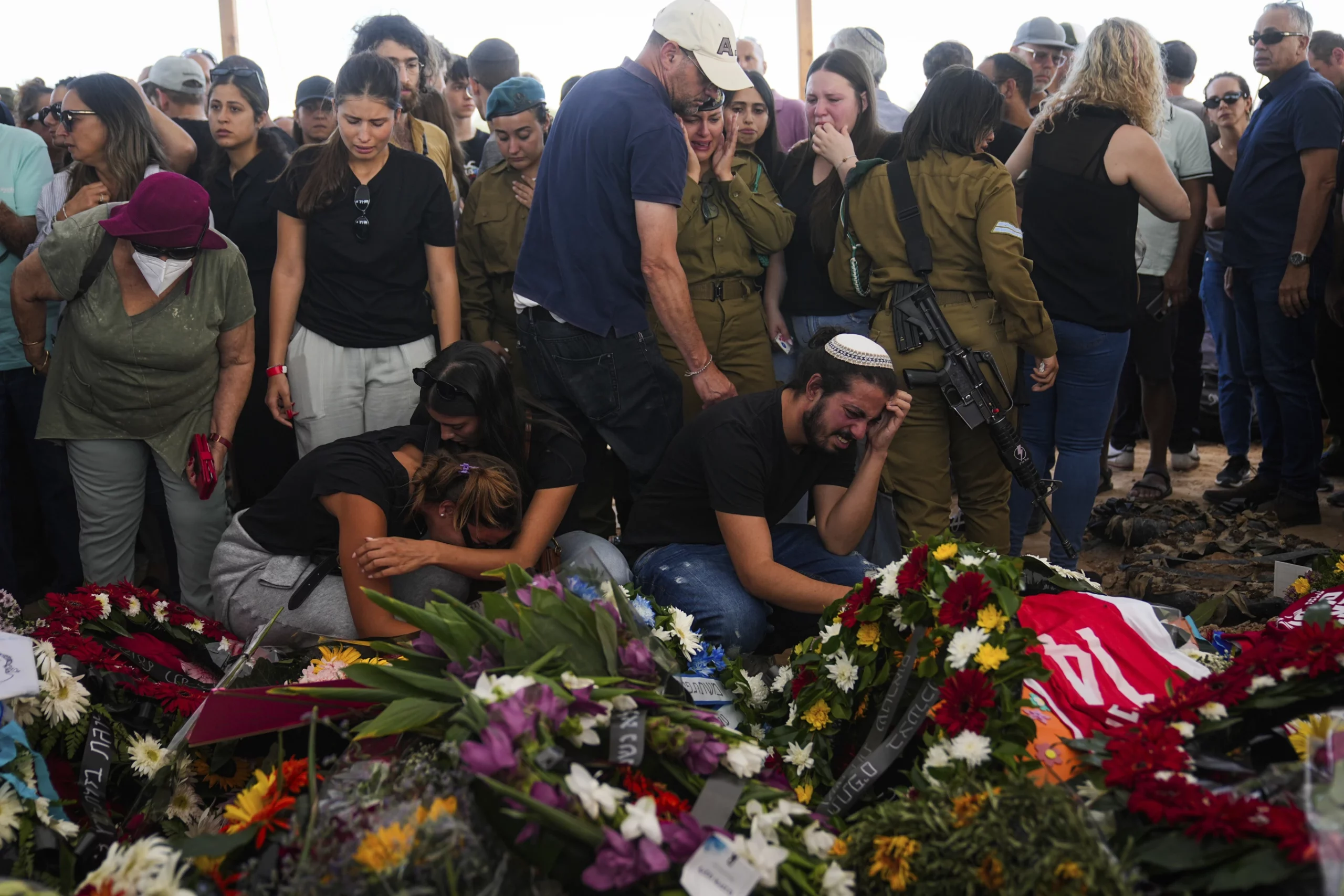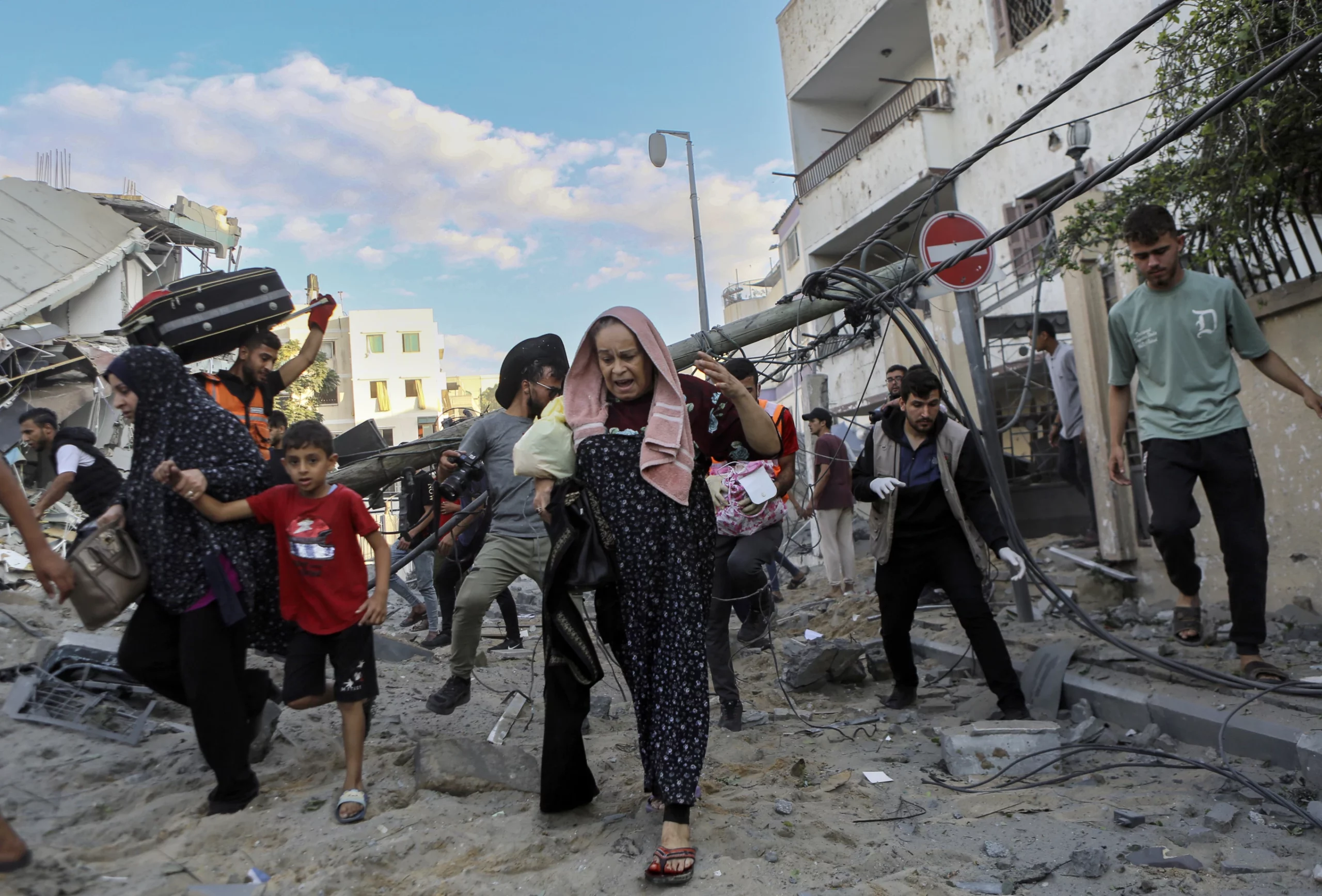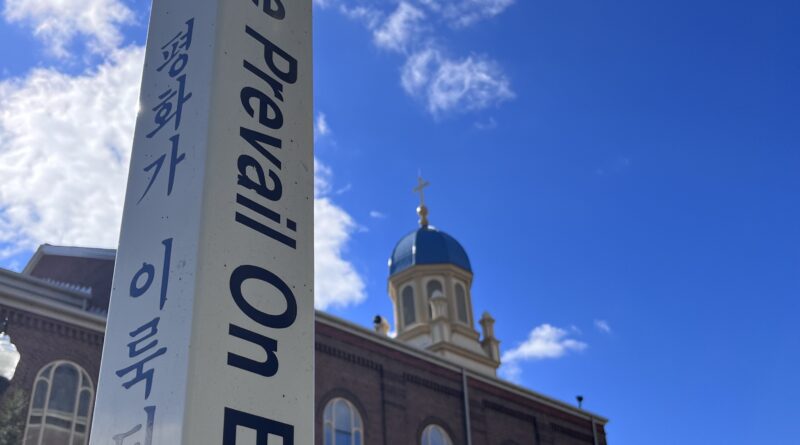ISRAEL AND HAMAS AT WAR
Pictured is the Peace Pole outside of the University of Dayton’s chapel. Photo courtesy of Lucy Waskiewicz for Flyer News.
What you need to know about the Israel-Hamas war and how UD students, faculty, staff and alumni are grappling with its impact
Lucy Waskiewicz | News Editor
Editor’s Note: This is a quickly developing story. All facts are as were publicly reported at the time of writing. Any details that have changed since were unknown at the time of writing.
On Oct. 7, a Palestinian militant and political group called the Islamic Resistance Movement, better known as Hamas, launched a surprise attack on Israel that killed at least 1,400 people. In the days since, a war has erupted, killing, wounding and stranding thousands of Palestinians and Israelis alike.
Here’s what you need to know and how UD students, faculty, staff and alumni have been affected.
Israeli-Palestinian tensions are long enduring
Israel is a United States-recognized country in the Middle East, bordering the Mediterranean Sea and directly northeast of Egypt. Within Israel’s borders are two territories, the West Bank and Gaza Strip, that are occupied by Palestinian people.
The United States does not recognize Palestine as a state or country. The United Nations, however, recognizes Palestine as a non-member observer state, meaning the U.N. recognizes Palestine as having state sovereignty over its territories. Despite this, the U.N. also recognizes the Israeli occupation of Palestinian territories.
Both Israel, which is predominantly Jewish, and Palestine, which is predominantly Arab, have historically occupied the land within Israeli borders for a period of time in its tumultuous history. Now, and for the past century, both claim the rights to it.
Many historians and experts on the Middle East trace the Israel-Palestine conflict back to 1947 when the U.N. passed a resolution that divided the land into separate Arab and Jewish states. Each was allotted a part of the land that is now the country of Israel.
The Arabs rejected this resolution, many in their leadership stating that it was not the U.N.’s place to determine their land ownership. On the other hand, Jewish groups declared Israel’s independence, sparking the first Arab-Israeli war in 1948. Israel won the war and gained control over the land, in the process displacing over 700,000 Palestinian Arabs and reducing their U.N. land allotment by about 77%.
In the years following, Israel gradually transferred the government of Gaza and the West Bank, both predominantly populated by Palestinians, to the newly formed Palestinian Authority (PA). Many Israelis withdrew from both regions as a part of this process.
In 2006, the Palestinian Hamas militant group and political party was elected into power, ousting the long-dominant Fatah party. Hamas then took political control of Gaza, and elections haven’t been held in the region since.
Despite Hamas’ political control, the U.N. continues to classify Gaza as Israel-occupied due to the land, sea and air blockade Israel established on Gaza’s borders in 2007. Israel defended the blockade as “necessary” to keep militant groups from obtaining weapons, but has been criticized for its restriction of Palestinian civilian movement and the flow of essential resources like food and fuel.
After the Hamas political win, many countries, including the U.S., ended their aid to the PA and refused to acknowledge a Hamas government under the belief that Hamas was and is a terrorist organization.
The time since has seen dozens of violent clashes between the forces of Hamas, Fatah, Israel and neighboring countries. Thousands of Israeli and Palestinian civilians and military alike have died as a result of ongoing tensions and attacks.

Mourners at the funeral of an Israeli family of five killed in the Hamas attacks. Photo by Petros Giannakouris for AP Photo.
Hamas launches a surprise attack on Israel in October
On Oct. 7, 2023, Hamas launched a surprise coordinated attack on Israel by land, air and sea. The morning saw thousands of rockets launched into Israeli territory from Gaza. Hamas militants then stormed Israeli borders and entered 22 different towns and bases, killing more than 1,400 people and taking 150 hostages, according to Israeli authorities.
One notable site of violence was at the grounds of a week-long outdoor musical festival in Israel called the Supernova Sukkot Gathering. Minutes after a danger warning was issued to attendees, Hamas militants surrounded the festival and fired guns at those hiding or attempting to escape.
An Israeli emergency response group reported 260 bodies recovered from the site after the attack, which was the deadliest concert attack in history.
The festival’s organizer, Nova Tribe, condemned the attack in a Facebook post.
“What was planned to be the happiest and largest electronic music festival of the Nova Tribe has turned into a scene of unspeakable tragedy,” the post said. “We are present at the disaster site and its vicinity day in and day out, working hand in hand with security forces and authorities to find answers and help bring back all those who can return to their families and friends.”
Hamas leadership stated that the Oct. 7 attack, called “Operation Al-Aqsa Flood,” was in response to Israel’s siege of Gaza, occupation of Palestinian lands, crimes against Palestinians, and the Israeli desecration of the Islamic holy site Aqsa Mosque in Jerusalem.

Palestinian families flee their homes after Israeli air-strikes in their Gaza neighborhood. Photo by Abed Khaled for AP Photo.
Israel declares war and wages full-scale assault on Hamas
Following the Oct. 7 attack, Israel formally declared war on Hamas. In an address to the nation, Israeli Prime Minister Benjamin Netanyahu condemned Hamas’ attack and vowed to destroy them.
“The IDF [Israel Defense Forces] will immediately use all its strength to destroy Hamas’s capabilities,” Netanyahu said. “I say to the residents of Gaza: Leave now because we will operate forcefully everywhere.”
Israel proceeded to target Gaza and Hamas in a full-scale assault, launching airstrikes, dropping roughly 6,000 bombs and blocking the delivery of necessary supplies to Palestinians.
“There will be no electricity, no food, no water, no fuel,” Israeli Defense Minister Yoav Gallant said in a statement. “Everything will be closed.”
The airstrikes hit multiple hospitals, leaving many wounded Palestinians with no medical aid. Towns have been destroyed and hundreds of thousands of people have been displaced as a result of the destruction and evacuation order.
On Oct. 17, an explosion in a crowded Gaza hospital killed hundreds of Palestinians. The explosion garnered heavy media coverage and sparked protests in Lebanon, Iraq, Turkey, Iran and Jordan.
The Geneva Conventions classify targeting hospitals as a war crime.
Palestinian authorities and Israel traded blame for the hospital hit; Hamas cited an Israeli airstrike, and Israel accused another Palestinian militant group, Palestinian Islamic Jihad, who denied it. As of this writing, the group responsible for the explosion has yet to be confirmed.
As of Oct. 22, the Hamas-run Gaza Health Ministry has reported 4,561 Palestinians killed, and 14,245 injured. As of Oct. 18, 1,300 were reported missing beneath rubble.
As of this writing, the State Department has reported 32 Americans killed and 11 unaccounted for.
The United States backs Israel but calls for restraint, sends aid to Palestinian civilians
The U.S. has expressed explicit support for Israel in the ongoing war. On Oct. 10, President Biden addressed the nation to condemn Hamas’ attack as an act of terrorism and vowed to “stand with Israel.”
“So, in this moment, we must be crystal clear: We stand with Israel,” President Biden said. “And we will make sure Israel has what it needs to take care of its citizens, defend itself, and respond to this attack.”
He stated that Hamas does not stand for the rights of the Palestinian people.
“Its [Hamas’] stated purpose is the annihilation of the State of Israel and the murder of Jewish people,” he said.
Both Biden and Vice President Kamala Harris spoke to Netanyahu via phone prior to the president’s address. The U.S. has also sent humanitarian and military aid to Israel, a country which “has become, and remains, America’s most reliable partner in the Middle East,” according to the U.S. Embassy.
Following the explosion in the Gaza hospital, Biden backed Israel’s accusation that a Palestinian militant group was responsible, citing “the data I was shown by my Defense Department.”
However, the president has recently called for restraint by the Israeli military. In a televised interview on Oct. 15, Biden said he thinks it would be “a big mistake” for Israel to re-occupy Gaza.
“Hamas, and the extreme elements of Hamas, don’t represent all of the Palestinian people,” Biden said.
He also stated that while Hamas must be eliminated, there “need to be a Palestinian Authority. There needs to be a path to a Palestinian state.”
On Oct. 18, Biden took a trip to Israel, where he met with first responders and family members of those who died on Oct. 7. He also announced that the U.S. would be providing $100 million in humanitarian aid to Palestinians and had discussions with Egyptian and Israeli authorities, who agreed to allow civilian aid to Gaza from Egypt and to open up a route from Gaza’s southern border into Egypt.
Biden had planned to meet with Palestinian Authority President Mahmoud Abbas in Jordan, but the meeting was canceled after the Gaza hospital explosion.
The UD community grapples with war
Millions of Americans are feeling the effects of the Israel-Hamas war, including those of the UD community. Between students, faculty, staff and alumni, the conflict has hit home for a multitude of Flyers.
Samuel Dorf, UD professor and Honors Program acting executive director, is also a campus support contact for Jewish students. He described the wide-ranging, upsetting impact of the war on nearly all members of the Jewish community.
“ ‘We are not OK’ is an understatement,” Dorf said. “You will be hard-pressed to find a Jewish student, faculty, or staff member on campus who has not been impacted by the war. Many have family in the region.”
Dorf sent an email to Jewish students, faculty and staff the week of the war’s beginning, offering support, solidarity and resources.
“The scale of the violence is hard to comprehend, and as we process this loss amidst a rise of antisemitism nationally and internationally many of us feel numb, angry, shaken, fearful, withdrawn, and lonely,” the email stated.
The campus’ Muslim Student Association released a statement on their Instagram in support of the Palestinian people and encouraged readers to educate themselves on the crisis.
“We firmly stand united with the Palestinian people and their right to a free and unoccupied home,” the statement said. “We urge you to take the time to educate yourselves so that our voices can be heard in harmony and not in discord. It is essential to recognize that what the Palestinian people are going through is a humanitarian crisis, and choosing not to educate yourself inadvertently normalizes the apartheid state.”
The statement also advised those attending protests to be cautious and prepared, traveling in groups and letting others know of one’s whereabouts.
Off-campus, UD alumni like Vee Sanford also face effects of the Israel-Hamas war.
Formerly a UD basketball player, Sanford now plays in the Israeli Premier Basketball League. He is well-known for his game-winning shot against Ohio State that propelled the Flyers past the first round of the tournament in their 2014 NCAA Elite Eight run.
Now, Sanford is one of the millions who were in Israel when the Hamas attack began. He described his experience in a video chat with local news station WHIO-TV while awaiting an evacuation flight.
“Fortunately for us at the time we were in the north, but we know the north has gotten a lot worse,” he said. “The team allowed the Americans to evacuate and go to Greece.”
Sanford safely made it out of the country, but expressed his concerns for the online discourse surrounding the war.
“It’s kind of upsetting to see on social media people are torn between the two,” he said. “But just realize people’s lives are being taken on both sides and to just have some sincerity for what’s actually going on.”
On Oct. 12, UD sent a campus-wide email inviting students to join in a gathering around the Peace Pole by the Chapel of the Immaculate Conception to pray for peace, the Israeli and Palestinian people, and all those affected by war.
The email condemned violence, terrorism, hate and prejudice, and called upon members of the campus community to support and comfort those who are suffering.
“We acknowledge many innocent people are hurting due to ongoing war and conflict,” the email said. “Jews, Muslims and Christians; Israelis and Palestinians in the region are suffering, as are their families, friends, loved ones and communities around the world. While complex histories impact our feelings and can overwhelm our ability to imagine a clear path forward, we stand in our shared dignity.”
For continuing coverage of the war and the politics that surround it, Flyer News suggests The Washington Post, which regularly publishes updates. UD students can get a free subscription through Roesch Library.

